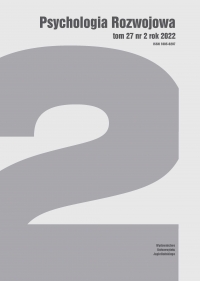Adaptacja wtórna i inne statusy kondycyjne żałoby rodziców po stracie dziecka
Secondary Adaptation of Parents after the Loss of a Child and Other Condition Statuses of Mourning
Author(s): Zofia DołęgaSubject(s): Social psychology and group interaction, Psychoanalysis
Published by: Wydawnictwo Uniwersytetu Jagiellońskiego
Keywords: bereavement status model; parents; child death; feelings of loneliness; coping strategies; social support;
Summary/Abstract: The article is devoted to the characteristics of a course of the psychological crisis caused by a critical event, which is the death of a child. The author of the work refers to the cyclical- phase model of developmental changes, which is well-known in the developmental psychology, and the Dual Process Model of Coping with Bereavement (DPM) of Margaret Stroebe, Henk Schut and Catrin Finkenauer (1999, 2001, 2010, 2013, 2015). What parents experience after the loss of a child is not an identical and parallel process. The course of mourning in parents is not the same. Rather, it is the interweaving of different states of mourning, sometimes with a regres- sion to previous states. The result is a different mental condition of the mother and the father as a consequence of dealing more or less successfully with the loss of a child. The paper, based on theoretical and empirical analyses, proposes an original model of four psychological statuses of parents after the loss of a child. It takes into account the differentiation of the mental condition of parents in connection with the possibility of adequate psychological help. The bereavement status model (MSK) takes into consideration the statuses of secondary adaptation, unfinished mourning, complex persistent bereavement disorder, and the status of possible post-traumatic growth. A hypothesis worthy of empirical verification has been formulated that in assessing the mental condition of parents after the loss of a child, it is worth proposing a specific diagnostic package containing information on the life situation of the family; the time that has passed since the death of a child; the sex of the parent; intensification of feelings of loneliness, availability of social support and its perception by parents, and the assessment of coping strategies for everyday stress. It remains an open question, what are the direct and indirect relationships between these variables and whether their differentiation proves the legitimacy of distinguishing certain condi- tioning statuses of mourning in parents after the loss of a child. This is currently the subject of an empirical research testing out the MSK model.
Journal: Psychologia Rozwojowa
- Issue Year: 27/2022
- Issue No: 3
- Page Range: 25-35
- Page Count: 11
- Language: Polish

